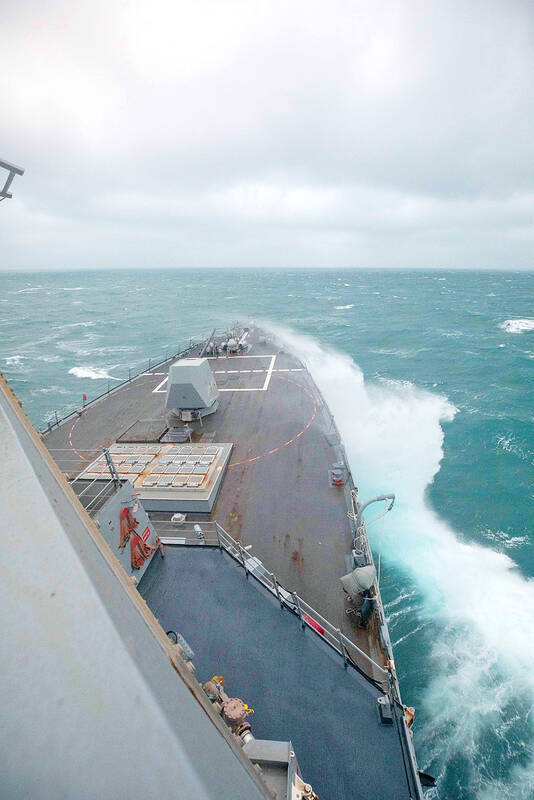A narrow majority of Americans would support committing US troops to defend Taiwan if China were to invade, a survey said on Wednesday.
The study by the Eurasia Group Foundation found that 42 percent of Americans would “somewhat support intervention” to support Taiwan and another 18 percent would “strongly” back intervention.
US President Joe Biden has publicly said he would back sending US forces to defend Taiwan, despite the official US position of ambiguity.

Photo: EPA
Mark Hannah, a senior fellow at the Eurasia Group Foundation, said that support for intervention in Taiwan could be linked in part to the negative image in the US of China, which has faced wide criticism on issues from trade to human rights.
“China is perceived as a bad actor and there could be a rally-around-the-flag effect if they invaded an island that is democratic and has been a long-term partner of the United States,” he said.
The survey took responses from 1,000 US adults from Aug. 28 to Sept. 6.
It found broad support for Taiwan, but Republicans were most likely to back intervention strongly.
Support was flipped on Ukraine, with backers of Biden’s Democratic Party most enthusiastic about the robust US support for Ukraine, which has been criticized by Republican former US president Donald Trump.
However, in one area that did not entirely mirror political statements, a bipartisan majority of 77 percent said they supported diplomacy with Iran to prevent it from obtaining a nuclear weapon.
The question did not specifically mention a 2015 nuclear deal with Iran which was negotiated by former US president Barack Obama and trashed by Trump.
A full 67 percent of Americans also said they backed direct negotiations with US adversaries “even if they are human rights abusers, dictators or home to terrorist organizations.”
The survey was taken before a bloody weekend assault on Israel by Islamic movement Hamas, which has support from Iran’s clerical leaders.

Taiwanese can file complaints with the Tourism Administration to report travel agencies if their activities caused termination of a person’s citizenship, Mainland Affairs Council Minister Chiu Chui-cheng (邱垂正) said yesterday, after a podcaster highlighted a case in which a person’s citizenship was canceled for receiving a single-use Chinese passport to enter Russia. The council is aware of incidents in which people who signed up through Chinese travel agencies for tours of Russia were told they could obtain Russian visas and fast-track border clearance, Chiu told reporters on the sidelines of an event in Taipei. However, the travel agencies actually applied

New measures aimed at making Taiwan more attractive to foreign professionals came into effect this month, the National Development Council said yesterday. Among the changes, international students at Taiwanese universities would be able to work in Taiwan without a work permit in the two years after they graduate, explainer materials provided by the council said. In addition, foreign nationals who graduated from one of the world’s top 200 universities within the past five years can also apply for a two-year open work permit. Previously, those graduates would have needed to apply for a work permit using point-based criteria or have a Taiwanese company

The Shilin District Prosecutors’ Office yesterday indicted two Taiwanese and issued a wanted notice for Pete Liu (劉作虎), founder of Shenzhen-based smartphone manufacturer OnePlus Technology Co (萬普拉斯科技), for allegedly contravening the Act Governing Relations Between the People of the Taiwan Area and the Mainland Area (臺灣地區與大陸地區人民關係條例) by poaching 70 engineers in Taiwan. Liu allegedly traveled to Taiwan at the end of 2014 and met with a Taiwanese man surnamed Lin (林) to discuss establishing a mobile software research and development (R&D) team in Taiwan, prosecutors said. Without approval from the government, Lin, following Liu’s instructions, recruited more than 70 software

Taiwanese singer Jay Chou (周杰倫) plans to take to the courts of the Australian Open for the first time as a competitor in the high-stakes 1 Point Slam. The Australian Open yesterday afternoon announced the news on its official Instagram account, welcoming Chou — who celebrates his 47th birthday on Sunday — to the star-studded lineup of the tournament’s signature warm-up event. “From being the King of Mandarin Pop filling stadiums with his music to being Kato from The Green Hornet and now shifting focus to being a dedicated tennis player — welcome @jaychou to the 1 Point Slam and #AusOpen,” the